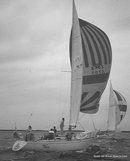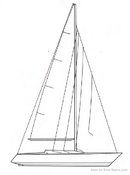Albin 107 Stratus
Sailboat specifications
The Albin 107 Stratus is a 35’2” (10.72m) cruiser-racer sailboat designed by Peter Norlin (Sweden). She was built between 1980 and 1984 by Albin Marine (Sweden) with 130 hulls completed.
Albin 107 Stratus's main features
- Model
- Albin 107 Stratus
- Hull type
- Monohull
- Category
- Cruiser-racer sailboat
- Sailboat builder
- Sailboat designer
- Sailboat collection
- Country
- Sweden
- Construction
- Hull and deck: GRP (glass reinforced polyester)
- Number of hulls built
- 130
- First built hull
- 1980
- Last built hull
- 1984
- Appendages
- Keel : fin without bulb
- Helm
- Single helm wheel
- Rudder
- Single spade rudder
- Unsinkable
- No
- Trailerable
- No
- Standard public price ex. VAT (indicative only)
- N/A €
Albin 107 Stratus's main dimensions
- Hull length
- 35’ 2”10.72 m
- Waterline length
- 27’ 2”8.3 m
- Beam (width)
- 10’ 10”3.3 m
- Draft
- 5’ 11”1.8 m
- Light displacement (MLC)
- 11464 lb5200 kg
- Ballast weight
- 4960 lb2250 kg
- Ballast type
- Lead
Albin 107 Stratus's rig and sails
- Upwind sail area
- 700 ft²65 m²
- Downwind sail area
- 1270 ft²118 m²
- Mainsail area
- 301 ft²28 m²
- Genoa area
- 398 ft²37 m²
- Jib area
- 205 ft²19 m²
- Symmetric spinnaker area
- 969 ft²90 m²
- IiFore triangle height (from mast foot to fore stay top attachment)
- 41’ 4”12.6 m
- JiFore triangle base (from mast foot to bottom of forestay)
- 12’ 10”3.9 m
- PiMainsail hoist measurement (from tack to head)
- 42’ 8”13 m
- EiMainsail foot measurement (from tack to clew)
- 14’ 1”4.3 m
- Rigging type
- Sloop Marconi 7/8
- Mast configuration
- Deck stepped mast
- Rotating spars
- No
- Number of levels of spreaders
- 1
- Spreaders angle
- 0 °
- Spars construction
- Aluminum spars
- Standing rigging
- 1x19 strand wire continuous
Albin 107 Stratus's performances
- Upwind sail area to displacementiThe ratio sail area to displacement is obtained by dividing the sail area by the boat's displaced volume to the power two-thirds.
The ratio sail area to displacement can be used to compare the relative sail plan of different sailboats no matter what their size.
Upwind: under 18 the ratio indicates a cruise oriented sailboat with limited performances especially in light wind, while over 25 it indicates a fast sailboat. - 233 ft²/T21.66 m²/T
- Downwind sail area to displacementiThe ratio sail area to displacement is obtained by dividing the sail area by the boat's displaced volume to the power two-thirds.
The ratio sail area to displacement can be used to compare the relative sail plan of different sailboats no matter what their size. - 423 ft²/T39.31 m²/T
- Displacement-length ratio (DLR)iThe Displacement Length Ratio (DLR) is a figure that points out the boat's weight compared to its waterline length. The DLR is obtained by dividing the boat's displacement in tons by the cube of one one-hundredth of the waterline length (in feet).
The DLR can be used to compare the relative mass of different sailboats no matter what their length:
a DLR less than 180 is indicative of a really light sailboat (race boat made for planning), while a DLR greater than 300 is indicative of a heavy cruising sailboat. - 258
- Ballast ratioiThe Ballast ratio is an indicator of stability; it is obtained by dividing the boat's displacement by the mass of the ballast. Since the stability depends also of the hull shapes and the position of the center of gravity, only the boats with similar ballast arrangements and hull shapes should be compared.
The higher the ballast ratio is, the greater is the stability. - 43 %
- Critical hull speediAs a ship moves in the water, it creates standing waves that oppose its movement. This effect increases dramatically the resistance when the boat reaches a speed-length ratio (speed-length ratio is the ratio between the speed in knots and the square root of the waterline length in feet) of about 1.2 (corresponding to a Froude Number of 0.35) . This very sharp rise in resistance, between speed-length ratio of 1.2 to 1.5, is insurmountable for heavy sailboats and so becomes an apparent barrier. This leads to the concept of "hull speed".
The hull speed is obtained by multiplying the square root of the waterline length (in feet) by 1.34. - 6.99 knots
Albin 107 Stratus's auxiliary engine
- Engine(s)
- 1 inboard engine
- Engine(s) power
- 22 HP
- Fuel type
- Diesel
- Fuel tank capacity
- 60.8 gal230 liters
Albin 107 Stratus's accommodations and layout
- Cockpit
- Closed aft cockpit
- Cabin(s)
- 2
- Berth(s) (min./max.)
- 5 / 7
- Head(s)
- 1
- Freshwater tank capacity
- 118.9 gal450 liters


Albin Marine Albin 107 Stratus - - 1/4
Picture extracted from the commercial documentation © Albin Marine
Picture extracted from the commercial documentation © Albin Marine


Albin Marine Albin 107 Stratus sailplan - - 2/4
Picture extracted from the commercial documentation © Albin Marine
Picture extracted from the commercial documentation © Albin Marine


Albin Marine Albin 107 Stratus layout - - 3/4
Picture extracted from the commercial documentation © Albin Marine
Picture extracted from the commercial documentation © Albin Marine


Albin Marine Albin 107 Stratus layout - - 4/4
Picture extracted from the commercial documentation © Albin Marine
Picture extracted from the commercial documentation © Albin Marine
Similar sailboats that may interest you:
Sailboats
First built hull
Hull length
1988
33’ 6”10.22 m
1986
31’ 6”9.6 m
1974
33’ 6”10.2 m
1983
34’ 10”10.6 m
1980
31’ 10”9.7 m
1982
38’ 1”11.6 m
1978
28’ 1”8.56 m
1971
30’9.14 m
1979
29’ 10”9.07 m
1970
36’ 5”11.08 m
1979
36’ 10”11.23 m
1988
34’ 10”10.6 m
1983
34’ 7”10.55 m
1989
37’ 8”11.5 m
1986
31’ 6”9.6 m